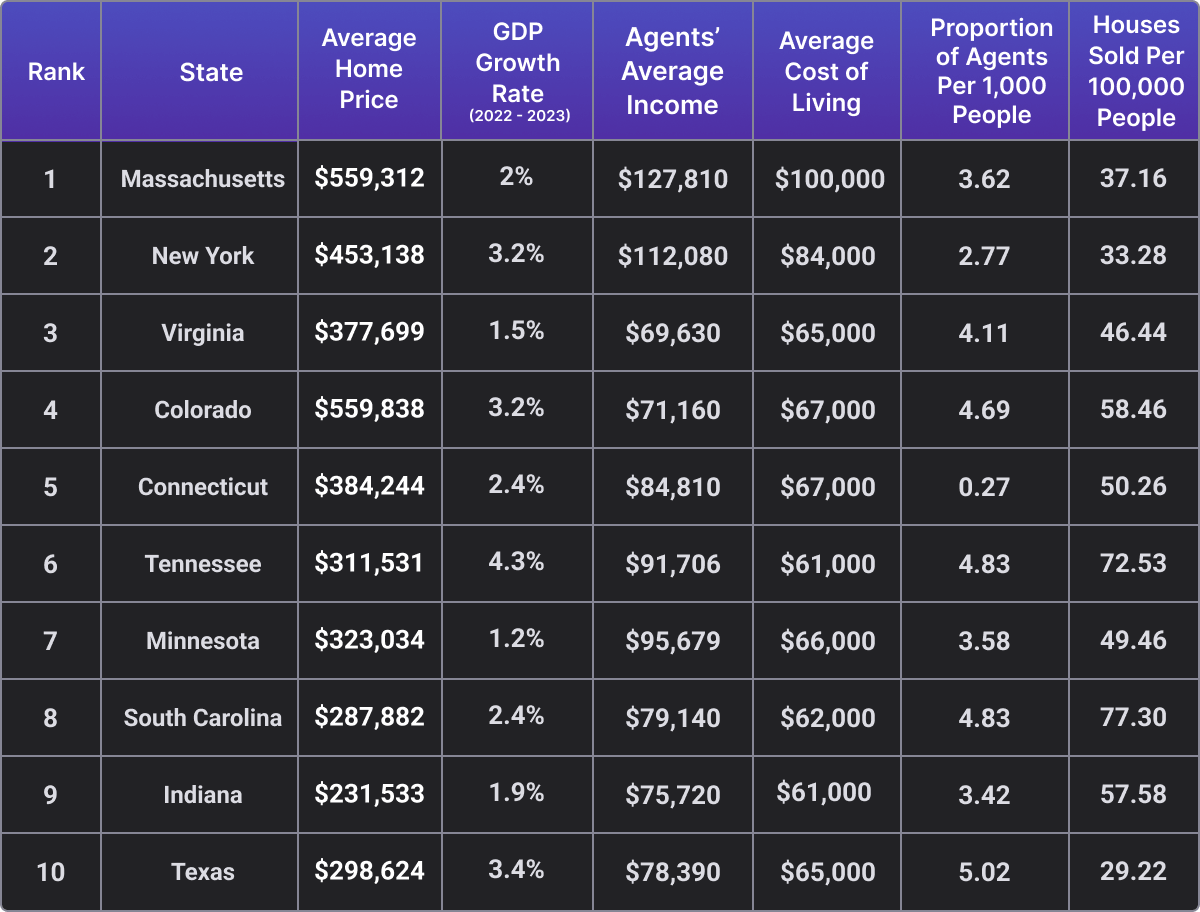When talking about any concept remotely related to real estate, the old adage “Location, location, location!” comes to mind. Just as buyers should be wary about “where to buy,” real estate agents should carefully consider which markets to focus on. True, there are people in every city, and they sure rent, buy, or sell properties, but thriving markets with strong economic growth and housing demands will provide more consistent and lucrative opportunities.
How many times have you heard agents complain about dormant markets, low inventory, or high taxes? It’s not just about how good an agent is; in part, it’s about where that agent is operating! That’s why real estate agents, especially less experienced ones, should know which states offer better opportunities. So why not look into five factors that help determine the best places to be a real estate agent?
1. Price Tags: Average Home Prices in Each State
As home prices increase, so do the commissions that agents earn. Therefore, it’s only reasonable to assume that places with more expensive homes promise larger payouts and greater financial rewards. If you disagree, think about why some agents choose to specialize in luxury real estate only!
So, one way to see where to operate as a real estate agent is to learn about the average home prices across every state. Here’s what we found in this regard after consulting various databases, including Forbes, World Population Review, The Mortgage Reports, and Fool.

Average home prices can directly translate into average commission, enticing you to determine the best places to start a career in real estate by this figure alone. Based on the information provided in this table, for example, one might assume that on average, real estate agents working in Hawaii and California are making more money than those in Mississippi and West Virginia per transaction.
That’s a reasonable thing to say, though we need to look at other factors before making any conclusions! The next factor is state population and average home sales.
2. Market Yield: Houses Sold per 100,000 People
High earnings in one place might come at the cost of fewer transactions or greater competition, while another market may offer steady, reliable opportunities that fly under the radar.
The table below, sorted based on the higher number of houses sold per a hundred thousand people, was compiled based on data provided by Valdostatoday, Statista, and Trading Economics.

A greater number of deals definitely shouts the best places to be a real estate agent, right?! So, should our fellow agents who might have been considering Hawaii a minute ago – which placed 46 based on the number of houses sold per 100,000 people – now book a flight to Carolina or Arizona?
Not yet! At least not before getting an idea about the number of agents already operating in these states and their income status!
3. The Competition: Number of Agents per 1,000 People
Understanding the ratio of agents to people, along with the average annual sales, helps us understand how competitive each state’s real estate market is. A higher proportion may indicate market saturation. That is to say, a greater number of agents might be fighting over the same slice of the pie, making it harder to find deals.
Conversely, a lower proportion of agents suggests less competition, offering more wiggle room to find and secure clients. By understanding this ratio, agents can prioritize markets where their services are more likely to be in demand, helping them increase their chances of success and maintain a steady income.

By putting the previous three tables together, patterns begin to appear. For instance, by the look of it, Florida sounds like a land of plenty and ranks 4th in terms of homes sold per 100,000 people. However, it has the highest proportion of agents per 1,000 people (10.47). This, combined with its moderately high home prices, suggests a highly competitive market that may be challenging for many agents. It’s the real estate industry’s red sea if you will…
On the other hand, California ranks relatively low (43rd) in terms of homes sold per 100,000 people, despite having a large number of agents. This suggests that the market may be saturated, making it more difficult for agents to secure deals, even though property values are high.
Are we now ready to elect the best places to be a real estate agent? Almost, but let’s not rush along! No matter what you’ve understood from the tables so far, you might see a sharp plot twist when you dive deeper into the underlying factors! Let’s see what else we should consider to properly categorize the best states for real estate agents.
4. The Dough Itself: Agents’ Average Income
Unless you’re an agent with a legendary reputation, you’re more than likely to perform similarly to other agents in your state. In other words, if a significant number of agents are earning a certain income over a given period, you can expect a similar outcome for yourself.
And that won’t happen overnight! It takes time to build a reputation in a new area. Therefore, aside from the factors we’ve already considered, we should also consider agents’ average income in each state.

Like finding an oasis in what seemed like a barren desert, the new data on agents’ average income drastically changes the game. Markets previously considered less attractive due to fewer transactions or high competition now offer significant income opportunities.
For example, Mississippi and Montana, which looked somewhat like dry wells, turned out to be more fruitful than expected with the new data added. Mississippi ranks 23rd in average agent income ($67,770) while Montana ranks 34th ($60,770), suggesting that while these states have fewer transactions, agents operating in these regions can still earn a decent income. This highlights how less competitive markets, though quieter, can still offer rich rewards for those willing to dig a little deeper.
The amount of money you make can be pretty tempting to choose the best places to be a real estate agent. But now that we’ve come this far, why not go a bit further? We still have two other very important factors to examine: 1) Living costs and 2) market growth. These two concepts can definitely affect an agent’s decision to enter a new market.
5. Present & Future: Living Costs & Market Growth
A healthy market cheers everyone up just like a rising tide lifts boats! In market terminology, that tide is the growth of Gross Domestic Product (GDP).
Simply put, GDP measures the overall value of all products and services delivered in a given region over a certain period. A growing market entails a rising GDP, putting more money in people’s pockets, which, in turn, can spark more purchases that also include real estate deals.
Simultaneously, we shouldn’t overlook living costs! What’s the point of earning lots of money and spending it to the last penny the same day? If the cost of living rises faster than agents’ incomes, even a booming market may not feel like real progress.
So, before making our list of the best places for real estate agents, let’s take a look at the GDP growth rate of US states and their average living costs as per the statistics in the above-mentioned sources.

If we were to base our decision solely on these two factors, Tennessee and Idaho would be our first choices. With fair living costs of $61,000 and $63,000 and impressive GDP growth rates of 4.3% and 4.9%, respectively, these two states offer both affordability and strong economic prospects. But having reviewed all the tables in this article, that wouldn’t be wise, would it?
Thus, in order to find the best places to be a real estate agent, we should look for states where:
- The living costs are lower than the agents’ average income;
- Average home prices are moderate or, more preferably, high;
- There aren’t more than four agents per 1,000 individuals;
- There are a considerable number of home transactions annually; and,
- The market has a growing GDP growth rate.
It’s high time we laid everything out on the table to see where the numbers take us!

Putting all the pieces together, the 10 states mentioned above show greater potential for real estate agents, with Massachusetts, New York, and Virginia emerging as top contenders for success. Based on the current data, these three states offer healthy markets where agents can benefit from the increasing demand and secure lucrative deals.
Comparing the average annual living costs and income, we can see that there is a safe margin of $13,000-27,000 for most agents, promising financial stability and career development.
Except for Texas, Indiana, and South Carolina, property values in other states tend to be moderate and higher, which entails greater commission rates for agents.
However, in most states, the ratio of agents to people ranges from three to five per 1,000 individuals, showing how competitive these markets are! Lastly, with 29.22 to 72.53 transactions per year, there seem to be enough properties and deals to go around for every agent.
Implications for Real Estate Agents
Real estate impacts people’s lives in every corner of the world, and the advantages of a career in real estate can be found just about anywhere. However, there are certain locations where being a real estate agent may be more promising due to more favorable market conditions.
The top 10 best places to be a real estate agent listed above still hold a significant edge. But before packing your stuff and relocating, there are two important points you need to consider:
- Getting your real estate business off the ground is always difficult! It takes time and persistence to build a client base and handle the complexities of the market.
Simply moving to a land of opportunities will not bring you a fortune! As the data showed, states with more opportunities for agents have a more competitive market, meaning that new agents might have to put more effort into their work to stand out and gain traction. If you’re already established in a market, think twice before starting from scratch in a more lucrative one… - More importantly, remember that not all cities in these states offer the same level of opportunity! While some cities might have a booming market, others may be rather dormant. The numbers given were the average data for a state, so research deeper before purchasing a ticket.
So, now that you’ve learned about the best places to be a real estate agent, why not look for the best cities for real estate agents where demand is highest, competition is manageable, and market conditions are favorable?
Time to Pack Your Bags?
If you have previously searched for the best places for real estate agents, you might have come across different lists with different names! That’s because there are numerous angles to this topic, with each one measuring different variables.
In our study, we tried to take the most defining factors into account while ensuring a balanced approach, without overemphasizing minor details that might have skewed the overall picture. Make sure to consult other sources to make the right decision.





